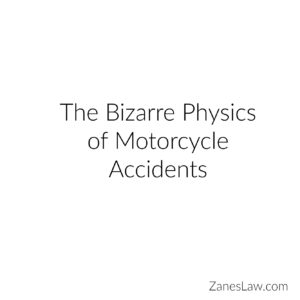![]() Contact Us (866) 499-8989
Contact Us (866) 499-8989
How Can Motorcycle Passengers Help Prevent Accidents?
- Don't Make Sudden Movements
- Keep Your Feet on the Footrests
- Hold on Tight
- Use Hand Signals to Communicate
- Don't Take a Ride With an Intoxicated Motorcycle Driver
- Additional Safety and Accident Prevention Tips for Motorcycle Passengers
- What to Do if You've Been in a Motorcycle Accident
- Contact a Reliable Motorcycle Accident Attorney Today
- Home
- FAQs
- Motorcycle Accidents
- How Can Motorcycle Passengers Help Prevent Accidents?
When you ride as a passenger on a motorcycle, the driver’s level of skill and safety knowledge will likely determine whether it’s a pleasant ride or one that ends in a serious accident. That said, your fate isn’t entirely in the driver’s hands. You can take a few measures to make sure things go smoothly.
At Zanes Law, we aim to provide the information and safety tips motorcycle riders need to protect their health. That’s why we’ve decided to educate you on how motorcycle passengers can help prevent accidents.
Don’t Make Sudden Movements
While moving around and adjusting your position in a car is completely safe, doing so on a motorcycle could cause a crash. Any movements you make as a motorcycle passenger could cause the bike to turn in an undesired direction or affect the driver’s ability to balance.
Instead of fidgeting or adjusting your position during the ride, try to make yourself comfortable before the drive begins. You may also adjust your placement at stop signs or red lights as long as you give the driver a heads-up. Doing so can help you be a good passenger and prevent a motorcycle accident.
For a free legal consultation, call (866) 499-8989
Keep Your Feet on the Footrests
According to ARS § 28-964, motorcycles must have footrests for the passenger. If a bike isn’t equipped with passenger footrests or if a passenger fails to use them, it could affect the bike’s stability and lead to an accident.
It’s also important to keep your feet firmly on the footrests if the driver accelerates unexpectedly. Abrupt acceleration could cause you to lose your balance if your feet aren’t securely placed on the passenger footrests.
If someone offers you a ride on their bike, always check to make sure they have footrests. Riding without them is illegal and dangerous to everyone on the road.
Hold on Tight
Another way to prevent accidents as a motorcycle passenger is to hold on tight to the bike’s handholds. If the bike doesn’t have handholds, you’ll want to embrace the driver from behind or hold onto their waist. If you aren’t comfortable embracing the driver, you can also hold onto their belt loops.
Holding onto the driver increases safety and allows you to read their body language better. That way, you’ll be able to follow their lead and ensure you’re not shifting your weight in a way that could cause the bike to tip over.
Whatever you do, don’t hang on to the driver’s shoulder at any point during the ride. Doing so offers no security and could throw the driver off balance.
Click to contact our personal injury lawyers today
Use Hand Signals to Communicate
Due to the sound of the road and the motorcycle engine, you won’t be able to talk to the driver unless you’re stopped at a red light. Instead of yelling over the noise, try using hand signals to communicate. Make sure you talk to the driver before riding about the hand signals you might use and what they mean.
It can be helpful to have a hand signal that indicates you need to stop and take a break. If you’re not feeling well, letting the driver know as soon as possible can help prevent a motorcycle accident.
Complete a Free Case Evaluation form now
Don’t Take a Ride With an Intoxicated Motorcycle Driver
According to Arizona Motor Vehicle Crash Facts, impaired driving is one of the primary factors behind traffic accident fatalities. If you’re offered a motorcycle ride by an individual who you believe is intoxicated, you should refuse the ride and advise them to call a cab.
Turning down a ride from an impaired driver can help you prevent a motorcycle accident, protect your health, and potentially save a life.
Additional Safety and Accident Prevention Tips for Motorcycle Passengers
There are so many ways that motorcycle passengers can help prevent fatal accidents and ensure a safe ride. Here are some additional safety measures you can take to protect your health and avoid an expensive hospital bill:
- Wear a helmet.
- Wear pants that cover your ankles, preferably leather.
- Wear a jacket.
- Tie your hair back if you have long hair.
- Stay aware of your surroundings and other drivers at all times.
- Signal to the driver if you see something dangerous ahead.
- Brace yourself when the motorcycle comes to a stop.
- Make sure the driver is experienced and aware of motorcycle safety rules.
- Don’t distract the driver.
Taking the abovementioned precautions can dramatically reduce the chances of you being seriously injured in an accident. Now that you know how to prevent motorcycle accidents from the passenger seat, it’s time to hit the road!
What to Do if You’ve Been in a Motorcycle Accident
Unfortunately, even the safety motorcycle passengers and drivers can get into an accident when sharing the road with a careless motorist. If you’ve been injured in a bike crash, you might be in pain, confused, and unsure of what to do.
Here’s what you should do after a motorcycle accident:
- Seek medical attention immediately
- Call law enforcement
- Take photos of your injuries and vehicle damage
- Exchange insurance information with the at-fault driver
- Speak with eyewitnesses and take down their information
- Contact an attorney ASAP
Getting checked out by a doctor should be your priority after a bike crash. Once you’ve been treated for your injuries, you’ll want to contact a lawyer. An experienced attorney can help investigate the accident and build a strong insurance claim.
They’ll work hard to secure the compensation you need to pay for your medical bills and cover other accident-related losses.
Contact a Reliable Motorcycle Accident Attorney Today
Although there are many ways that motorcycle passengers can help prevent accidents, there’s not much you can do to protect yourself when faced with a reckless driver. If you’ve been injured in a bike collision caused by another driver, you could be dealing with exorbitant medical bills, painful complications, and several other challenges.
Fortunately, the team at Zanes Law is here to help you take legal action. A motorcycle accident lawyer from our firm can collect the evidence necessary to support your claim and secure your compensation. If your case is successful, you’ll get the money you need to treat your injuries and recover from other setbacks. Contact us to schedule a free consultation.
Call or text (866) 499-8989 or complete a
Free Case Evaluation form
 The Bizarre Physics of Motorcycle Accidents
The Bizarre Physics of Motorcycle Accidents
The Bizarre Physics of Motorcycle Accidents Riding a motorcycle on today's highways, you have to ride in a very defensive manner, and it's helpful to understand the physics of motorcycle accidents.
 Zanes Settles a Motorcycle Accident for Over $400,000
Zanes Settles a Motorcycle Accident for Over $400,000
The legal team at Zanes Law is thrilled to announce its latest big win. In early February, we settled for $410,000 after our client’s motorcycle rear-ended another vehicle. The settlement
 5 Tips for Safely Riding Your Motorcycle this Summer
5 Tips for Safely Riding Your Motorcycle this Summer
Nothing is better than hopping on your motorcycle and going for a ride on a nice summer day. But before you turn on the engine, it’s important to be sure that you understand how to stay safe. Here
 How Negligence Is Established in a Motorcycle Accident
How Negligence Is Established in a Motorcycle Accident
After a motorcycle accident, both victims need to pay for their injuries and property damage, but who pays whom? In at-fault states like Arizona, the person who is more negligent pays. The law states
Receive a Free, No-Obligation, Case Evaluation Now



